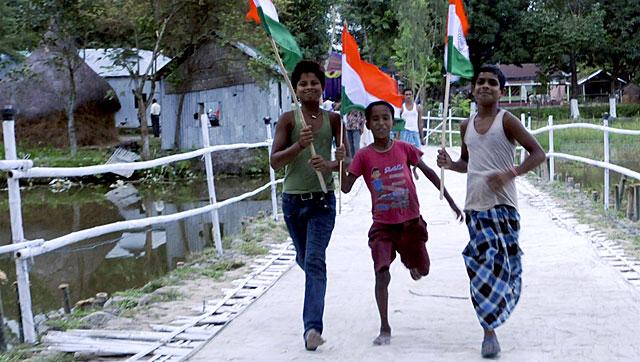HEADLINE
Bangladeshi or Indian: 50.000 Stateless People Finally Choose Their Home
"Imagine your citizenship has been denied for 4 decades."
Bismillah Geelani

This is the first time the Indian national flag has been hoisted in Cooch Bihar, near the India-Bangladesh border.
People are celebrating by popping off firecrackers, shouting slogans, and lighting hundreds of candles.
Diptiman Sengupta is among the enthusiastic crowd, said, “Today we have got that identity; we have a country now and our right to be counted among humans has been established.”
“A human being is a human being but there are certain things with which they are identified, and the most important of them is the country they belong to. But we had no country so we were not considered human,” he added.
On the other side of the border, in Dashia Choda, hundreds also marched on the streets, waving Bangladeshi flags and cheering.
Mehfoozur Rahman led the celebrations on the Bangladeshi side. He says, “We thank Allah that we have finally been freed. Now we will be independent citizens of this country.”
The celebrations followed a landmark agreement between India and Bangladesh called the Land Boundary Agreement or LBA. Both countries agreed early August – putting an end to a long-standing border dispute.
The dispute dates back to 1947, to the partition of India. Pakistan was created as a separate nation and at the time, what is now Bangladesh was also included in Pakistani territory.
The boundaries were drawn by British authorities and left parts of one country surrounded by another. Known as enclaves, the areas were impossible to control.
As a result, tens of thousands of people living in the area were left stateless and couldn’t enjoy all the benefits of citizenship.
“These people are essentially in an enemy territory as it were, a hostile territory. So you have Indians living in the territory of Bangladesh and vice versa,” said Senior Journalist Nilova Roy Chaudhary who has been writing about their plight.
He added, “They don’t have access to the most basic civic services forget about buying land and other things. They are in a state where they do not have access to market, where they do not have schools and no civic services. It’s a mess. They are just left there to their fate.”
In 1971, Bangladesh broke free of Pakistan with help from the Indian military. The two friendly neighbors then agreed to resolve the border dispute in 1974. But political compulsions in both countries delayed that process for more than 4 decades.
Asma Bibi was in labor when an Indian hospital refused to admit her five years ago. “The doctors said, ‘Go away, you are a Bangladeshi and we won’t admit you’. I told him I live in an enclave and needed his help but he didn’t listen. When I refused to leave the hospital he demanded our documents. We had none so he threatened to get me arrested,” she recalled.
After hundreds of people protested in front of the hospital, Bibi was allowed to give birth there. But she has not yet been able to get a birth certificate for her child.
Rashid Ali has a similar experience. He couldn’t admit his son into an Indian school until one of his Indian friends agreed to pose as the father. None of the children from the enclaves use the real name of their fathers in the school records.
“It’s so painful to see your son naming someone else as his father but we had no options left. This is the only way we can give our children an education. I’m illiterate but I don’t want this to happen to my son. He must study at any cost,” Rashid said.
Following the landmark resolution, India and Bangladesh have exchanged thousands of acres of land. And those living in the enclaves were told they could choose their citizenship.
Most people in the enclaves are Muslims and about two thirds of them chose to become formal citizens of Muslim-majority Bangladesh. The others chose India.
The agreement is being hailed in both countries as ground breaking. Both countries have welcomed their new citizens and assured them all help will be provided for rehabilitation.
“The India-Bangladesh relationship has to be taken to new heights. So I think it’s the beginning of that journey that we are now witnessing,” said Zauqi Ahad is Banladesh’s Deputy High Commissioner in India.
India Prime Minister Narendra Modi says this is a historic event for both countries. “Some people have compared it to the fall of the Berlin wall and I think they are quite right,” he said.
But Modi is upset by what he described as ‘the cold response’ of the international community. “Had this event taken place anywhere in the developed world it would have been celebrated the world over as a historic moment and would have certainly qualified for a Nobel Prize, but since we did it nobody will talk about it because we are poor nations,” Modi added.
- India
- eng
- Bangladesh
- stateless
Komentar
KBR percaya pembaca situs ini adalah orang-orang yang cerdas dan terpelajar. Karena itu mari kita gunakan kata-kata yang santun di dalam kolom komentar ini. Kalimat yang sopan, menjauhi prasangka SARA (suku, agama, ras dan antargolongan), pasti akan lebih didengar. Yuk, kita praktikkan!